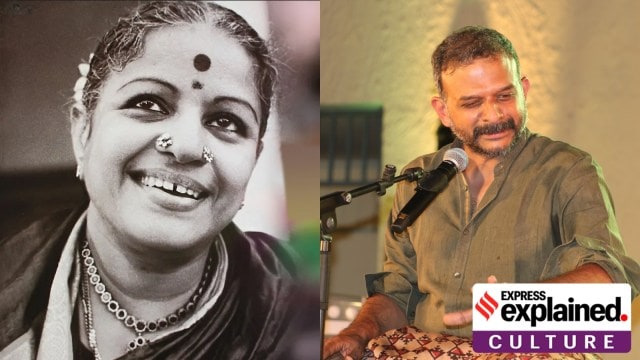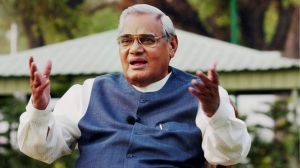Why T M Krishna’s ‘criticism’ of M S Subbulakshmi is in fact a commentary on society at large
In its recent order, Madras High Court called for respecting the legendary singer’s wishes. The legal battle spotlighted the fault lines in the Carnatic music establishment, and the questions raised by Krishna, its famous insider
 T M Krishna’s (right) veneration for M S Subbulakshmi’s music comes through clearly in his writings, lectures, and interviews. What seems to have irked some, however, is his analyses and commentary on the broader social context of the evolution of her music. (Wikimedia Commons)
T M Krishna’s (right) veneration for M S Subbulakshmi’s music comes through clearly in his writings, lectures, and interviews. What seems to have irked some, however, is his analyses and commentary on the broader social context of the evolution of her music. (Wikimedia Commons)Earlier this week, Madras High Court allowed The Music Academy, Madras, to confer the Sangita Kalanidhi Award — considered the highest honour for a Carnatic musician — on vocalist T M Krishna, but asked for the removal of M S Subbulakshmi’s name from the mirror award given alongside, which is called the Sangita Kalanidhi MS Subbulakshmi Award, and a cash prize of Rs 1 lakh.
Sangita Kalanidhi was instituted in 1942 by the Music Academy. Before that, since 1929, a senior musician was invited to preside over the annual music conference. After Subbulakshmi’s passing in 2004, the Academy and The Hindu newspaper group instituted the cash award and called it ‘Sangita Kalanidhi MS Subbulakshmi Award’. While Subbulakshmi won the award in 1968, Bombay Jayashree was awarded the prestigious honour last year.
The HC order came on a civil suit filed by V Shrinivasan, Subbulakshmi’s step-grandson (her stepdaughter Radha Vishwanathan’s son), who had sought to bar The Music Academy from giving the award to Krishna as he felt that writings and talks by the musician had been “vile, vituperative and disparaging” to Subbulakshmi.
Krishna denied this in a counter-affidavit, saying his writings and talks were taken out of context and selectively interpreted by Shrinivasan.
In his verdict, Justice G Jayachandran said Krishna’s opinion, “whether good, bad or ugly will not disqualify him from getting the title Sangita Kalanidhi”. But citing Subbulakshmi’s will from 1997, he said that using her name in the mirror award would be a violation of its contents.
According to the will, no trust, memorial, statue, or bust should be instituted in her name and memory, and no donations should be made for the purpose.
So are there no honours in Subbulakshmi’s name?
The court said that “a violation of a dead person’s wish cannot be entertained or allowed…under the guise of commemorating or honouring her”.
However, over the years, several fellowships and awards have been instituted in Subbulakshmi’s name, including a famous one by Shri Shanmukhananda Fine Arts and Sangeetha Sabha established to commemorate her centenary. The institute in Mumbai also has a statue of Subbulakshmi in the front foyer.
There is also a huge bronze statue of Subbulakshmi holding a tanpura in Tirupati, and her bust at the Sri Rama Lalitha Kala Mandira, the seven-decade-old Carnatic classical institute in Bengaluru.
What did Krishna say about Subbulakshmi?
Krishna’s veneration for Subbulakshmi’s music comes through clearly in his writings, lectures, and interviews. What seems to have irked some, however, is his analyses and commentary on the broader social context of the evolution of her music.
Krishna has referred to Subbulakshmi’s Devadasi roots, and asked whether the Carnatic community would have still built a halo around her and treated her like a deity if she had not “Brahminised” herself, or was dark-skinned.
He has also examined the changes in Subbulakshmi’s music that came with this transformation — from her days in Madurai to later marrying a Brahmin, distancing herself from her roots, and tailoring some of her music due to the restrictions that were placed on her life.
Krishna has tried to find out what Subbulakshmi lost on the way to attaining her God-like status — in looking at her life and times, the concept of freedom of an artist, and the choices she has to make, he has addressed questions relating to society at large.
So what is the problem with this analysis?
Krishna wrote in The Caravan about Subbulakshmi’s iconic ‘Suprabhatam’, which he described as a “popular coup” but “a musical free fall as far as the serious listener was concerned”.
In response, Shrinivasan wrote in The Deccan Herald, “It is inexplicable how the Suprabhatham, which will be remembered for centuries, can be dismissed as a musical free fall.”
The issue here is the sensitivity of some to an intellectual commentary about the life and music of a revered icon.
Krishna spoke of Subbulakshmi’s aesthetic transformation after her role in Meera, and of the way her voice was suppressed and structured even when it was beautiful. In an essay titled ‘Let’s Not Succumb to Misremembering MS Subbulakshmi’ in The Wire, Krishna wrote, “She was, what my daughter’s generation would call, sexy”, and was criticised strongly for using the word sexy in the context of Subbulakshmi.
Of course, Krishna, an insider, was writing about a revered figure in the world of classical music, highlighting what he thought and saw.
But those who admire Subbulakshmi were offended.
How did this debate play out in the Sangita Kalanidhi Award controversy?
This March, after N Murali, president of The Music Academy, announced this year’s Sangita Kalanidhi Award for Krishna, several personalities in the Carnatic classical establishment protested. The winner of the Award presides over the prestigious December Music Season, Chennai’s grand celebration in the Marghazi month.
Three days later, sister duo Ranjani-Gayathri withdrew from the season citing “glorification of a figure like EVR (Periyar)… and insults of icons like Thyagaraja and MS (Subbulakshmi)”. Thereafter, other artists including Trichur Brothers and Chitraveen Ravikiran, also withdrew from the festival.
Murali had responded to the letter written by Ranjani-Gayathri, saying it was “replete with unwarranted and slanderous insinuations verging on defamation” and that the award was chosen after “careful deliberation”.
The controversy also took a political dimension — Krishna has been a vocal critic of several policies of the BJP government, and had spoken about the “frenzy” around Ram Temple in Ayodhya, while Ranjani-Gayathri had given a special online concert on the day of the temple’s Bhoomi Poojan.
What are Krishna’s disagreements with the Carnatic music ‘establishment’?
Krishna’s pitch for inclusiveness in the arts and his perspective on Indian politics has attracted both bouquets and brickbats.
Krishna has been criticised for his Christian and Islamic Carnatic songs — which he says is an attempt at making the art form accessible to non-Hindus as well.
Krishna has also been at the forefront of challenging caste rigidities and gender politics in Carnatic music, and has criticised the non-inclusivity of the December Music Season.
In 2015, he pulled out of singing at the Music Academy after he felt that the famed Season, which had stemmed from the Music Academy’s first annual conference on Carnatic music in 1929, was increasingly being driven by “commodification”, besides being “socially stifling”. He spoke of non-Brahmin musicians and certain art forms such as Pariyattam, Villupattu, Gaana-Pattu and Kuthu being left out.
He has also rebelled against limiting classical forms to certain specified spaces, and has started a music festival in a fishing village to “push out caste elitism from the existing Carnatic music system”.
All of this has made the Carnatic music establishment uncomfortable — he has been advised to focus on singing rather than on activism, and many listeners and artists have decided to stay away from his music.
In an interview to The Indian Express earlier, Krishna had said: “When you challenge certain ideologies, certain ways or belief systems that are so powerful and call the entire thing an oppressive structure, it will be uncomfortable. I’m saying I will practise it, but I will question it and try to create a conversation.”
- 01
- 02
- 03
- 04
- 05






































